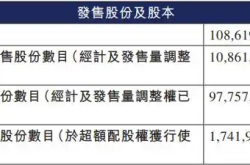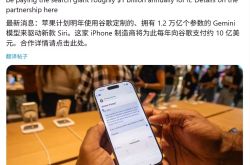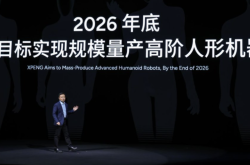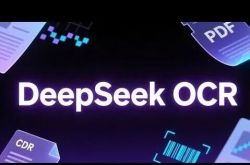A Whopping US$1 Billion! New Siri to Integrate Google's Gemini Large Model, Set to Launch Next Year
![]() 11/06 2025
11/06 2025
![]() 366
366
Will Apple Enthusiasts Embrace It?
Apple's foray into the realm of generative artificial intelligence has been a rollercoaster ride, filled with unexpected turns.
On November 6th, Bloomberg's Mark Gurman reported that Apple is gearing up to incorporate Google's Gemini large model to power its technical infrastructure, aiming to make the new iteration of Siri smarter and more robust.
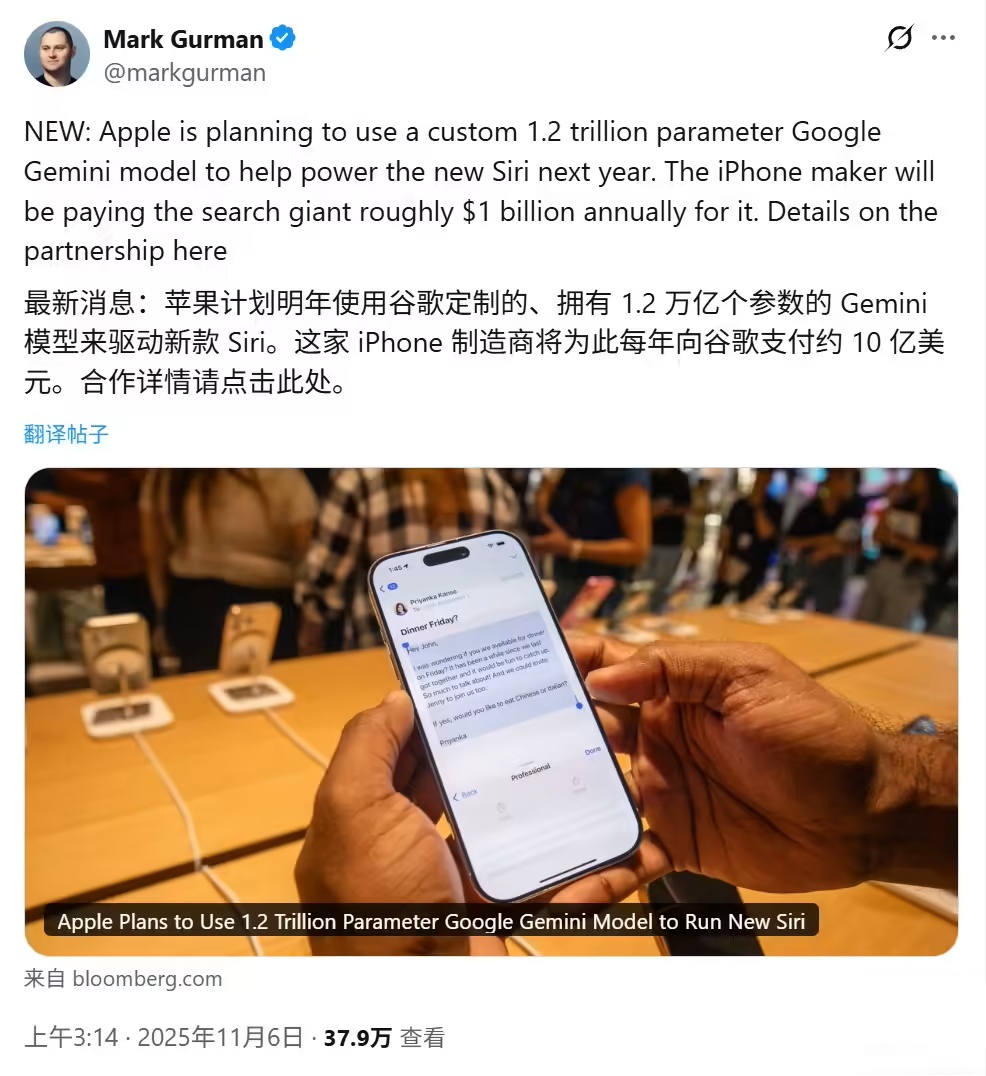
Image Source: X
Apple is reportedly set to pay Google a hefty sum of around US$1 billion annually for the rights to utilize a customized Gemini model, with the core variant being Gemini 2.5 Pro, which flaunts a staggering 1.2 trillion parameters.
Apple's ambition is to significantly bolster Siri's capacity to tackle intricate tasks. For quite some time, Apple has been on the receiving end of user criticism, with Siri often being perceived as lacking in intelligence.
Interestingly, Google, which serves as Safari's default search engine, currently shells out approximately US$20 billion annually to Apple. However, with Apple now set to pay Google an annual fee for the Gemini large model, the financial dynamics between the two tech giants are set to undergo a change.
Once the collaboration is in place, the Gemini large model will take charge of Siri's core functionalities, including information summarization, task planning, and the execution of complex, multi-step instructions.
In comparison to the current Siri, which relies on a cloud-based model with 150 billion parameters, the 1.2 trillion parameter Gemini large model represents a quantum leap in processing power and contextual understanding.
As for the deployment timeline, the upgraded Siri is anticipated to roll out to user devices in the spring of 2026, coinciding with the launch of the iOS 26.4 system. Subsequently, at the WWDC conference in June 2026, systems like iOS 27 and macOS 27 will further integrate this enhanced Siri.
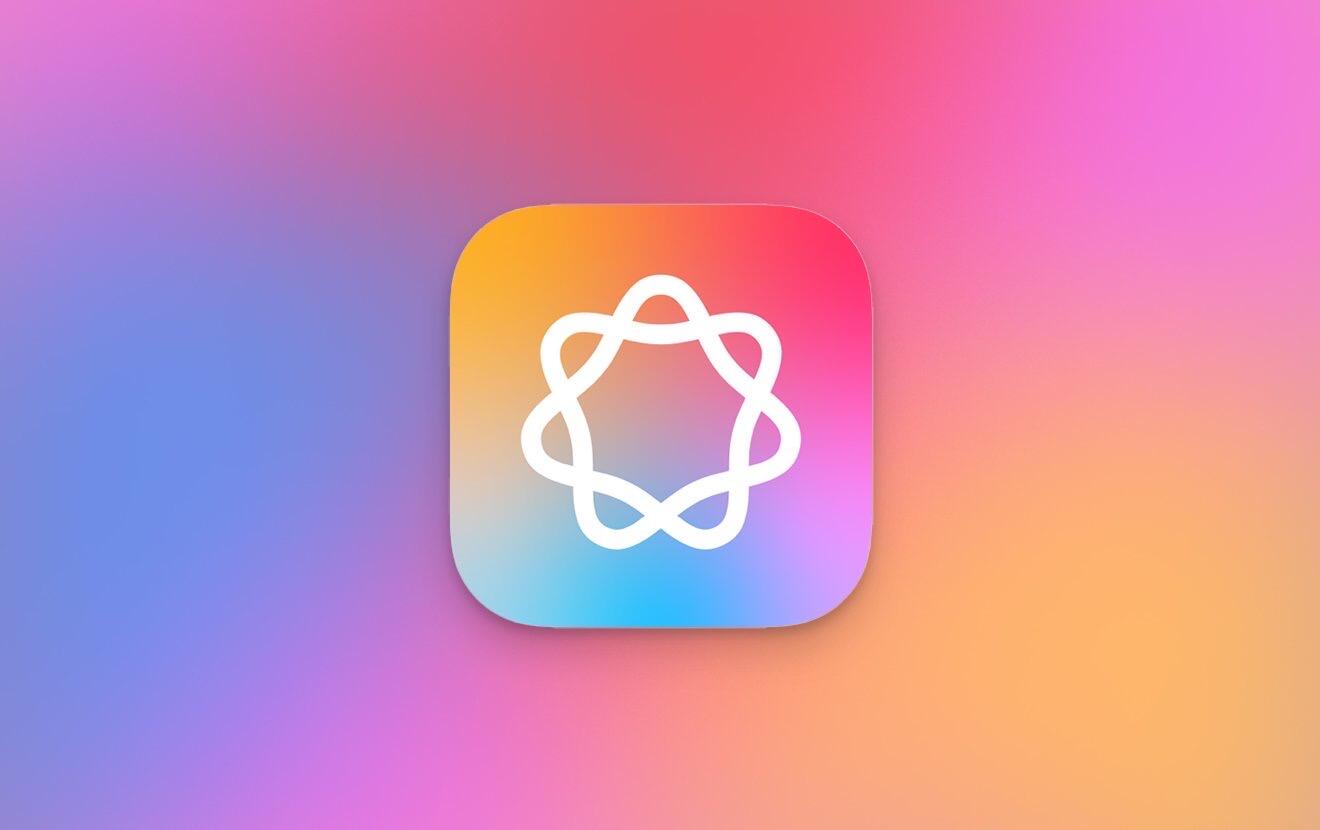
Image Source: Apple
Why Opt for Gemini?
Apple had previously evaluated three major mainstream models: ChatGPT, Claude, and Gemini, before ultimately settling on Google's Gemini as its partner of choice.
The key reasons behind choosing Gemini are as follows:
Firstly, from a financial perspective, it offers a more cost-effective solution. The annual collaboration cost with Anthropic Claude exceeds US$1.5 billion, which is higher than that of Gemini. (As previously noted, the cooperation cost with Google is around US$1 billion.)
Secondly, Apple and Google share a long-standing collaborative history, with Google being Safari's default search engine.
Lastly, Google's Gemini 2.5 Pro ranks highly in the WebDev Arena rankings, indicating its technical prowess.
When it comes to security, Apple has left no stone unturned.
The AI model developed by Google for Apple will be deployed within Apple's proprietary private cloud computing server environment. This ensures that Google will not have access to any data belonging to Apple users.
Moreover, Apple's current system architecture adopts a hybrid approach. Google's Gemini model is primarily tasked with handling complex cloud-based tasks, such as summarizing web search content and coordinating cross-application tasks.
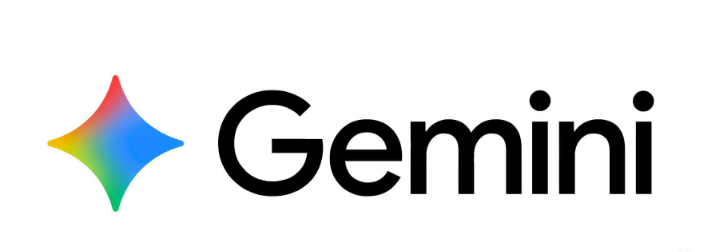
Image Source: Google
Meanwhile, Apple's in-house model continues to focus on processing personal data on the device, such as managing health information and interacting with local files.
This 'cloud + local' hierarchical collaboration model not only substantially enhances Siri's intelligence but also enables Apple to maintain firm control over its core data.
However, in my view, Apple may not be considering Gemini as a permanent solution.
According to informed sources, despite facing a talent exodus in the artificial intelligence sector, Apple's management remains committed to investing in the research and development of new AI technologies, with the aim of eventually replacing Gemini with its own in-house solution.
Apple's model team is currently focused on developing a cloud-based model with 1 trillion parameters. Apple's executives are confident that this new model can achieve a quality level on par with the customized Gemini.
Nevertheless, I believe that Google's Gemini 2.5 Pro currently holds a commanding lead in most large language model rankings, making it a formidable challenge for Apple to catch up.
Nonetheless, for Apple, the decision to integrate Google's Gemini large model signifies an acknowledgment of its lagging position in the artificial intelligence field and a willingness to leverage external technology to strive for catch-up and narrow the gap.
In conclusion, what are your thoughts on Apple's achievements in the AI landscape? Or why do you think Apple has faced challenges in this domain? Feel free to share your comments in the discussion area.

